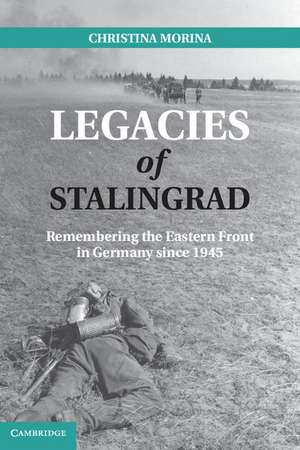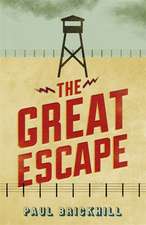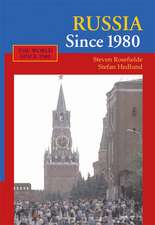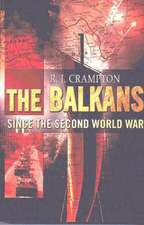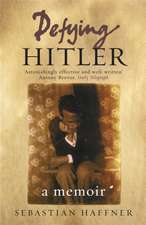Legacies of Stalingrad: Remembering the Eastern Front in Germany since 1945
Autor Christina Morinaen Limba Engleză Hardback – 18 sep 2011
Toate formatele și edițiile
| Toate formatele și edițiile | Preț | Express |
|---|---|---|
| Paperback (1) | 338.05 lei 6-8 săpt. | |
| Cambridge University Press – 21 aug 2013 | 338.05 lei 6-8 săpt. | |
| Hardback (1) | 695.93 lei 6-8 săpt. | |
| Cambridge University Press – 18 sep 2011 | 695.93 lei 6-8 săpt. |
Preț: 695.93 lei
Preț vechi: 781.95 lei
-11% Nou
Puncte Express: 1044
Preț estimativ în valută:
133.16€ • 139.41$ • 110.19£
133.16€ • 139.41$ • 110.19£
Carte tipărită la comandă
Livrare economică 05-19 aprilie
Preluare comenzi: 021 569.72.76
Specificații
ISBN-13: 9781107013049
ISBN-10: 1107013046
Pagini: 308
Ilustrații: 5 b/w illus.
Dimensiuni: 152 x 229 x 21 mm
Greutate: 0.57 kg
Ediția:New.
Editura: Cambridge University Press
Colecția Cambridge University Press
Locul publicării:New York, United States
ISBN-10: 1107013046
Pagini: 308
Ilustrații: 5 b/w illus.
Dimensiuni: 152 x 229 x 21 mm
Greutate: 0.57 kg
Ediția:New.
Editura: Cambridge University Press
Colecția Cambridge University Press
Locul publicării:New York, United States
Cuprins
1. Memory under occupation: the emergence of competing memories of the Eastern Front; 2. Cold War: political memory of the Eastern Front in divided Germany; 3. Lessons of the Eastern Front: the Wehrmacht legacy and the remilitarization of Germany; 4. Peacetime wars: official memory and the integration of individual wartime experiences; 5. The past reinforced: the memory of the Eastern Front from Ulbricht to Honecker; 6. The past revisited: West German memory of the Eastern Front in the era of détente.
Recenzii
“All too often, scholars of postwar Germany confuse the part for the whole by generalizing on the basis of its Western half. But as Christina Morina shows in her sensitively written book, it is impossible to understand how postwar Germans selectively remembered the war and their many victims without accounting for the asymmetry and interaction of rival eastern and western memory regimes. Legacies of Stalingrad is a major achievement of research and reconceptualization that historians of contemporary Europe cannot afford to miss.” – A. Dirk Moses, author of German Intellectuals and the Nazi Past (Cambridge 2007)
“The German-Soviet war was the largest and costliest conflict in world history. The experience left an indelible mark on postwar German society, but until now the narrative of that impact has been neglected in favor of the memory of the Holocaust. Christina Morina has succeeded in restoring the place of the Eastern Front in the history of memory in both East and West Germany and has done so with sensitivity and intelligence. This is an important addition to our understanding of how German society came to terms with the world-historical dramas in its recent past” – Richard Overy, author of The Twilight Years: The Paradox of Britain between the Wars (2009)
“A truly outstanding book. Political memories and diverging, selective appropriations of the legacies of Stalingrad are central to understanding the significance of the past in divided Germany after 1945. Morina has treated this fascinating and complex subject with theoretical sophistication and clarity, focusing on both biographical experiences and political circumstances. Essential reading for all who are interested in collective memory and the legacies of war.” – Mary Fulbrook, University College London
"...a timely contribution to the scholarship on the evolution and impact of collective memories in the postwar Germanies." -Eric Langenbacher, H-Memory
"Professor Morina has written a sophisticated study of World War II, and of how that memory shaped public discourse and eventually political policy: 'the public use of history.'" -Ronald Smelser, Holocaust and Genocide Studies
“The German-Soviet war was the largest and costliest conflict in world history. The experience left an indelible mark on postwar German society, but until now the narrative of that impact has been neglected in favor of the memory of the Holocaust. Christina Morina has succeeded in restoring the place of the Eastern Front in the history of memory in both East and West Germany and has done so with sensitivity and intelligence. This is an important addition to our understanding of how German society came to terms with the world-historical dramas in its recent past” – Richard Overy, author of The Twilight Years: The Paradox of Britain between the Wars (2009)
“A truly outstanding book. Political memories and diverging, selective appropriations of the legacies of Stalingrad are central to understanding the significance of the past in divided Germany after 1945. Morina has treated this fascinating and complex subject with theoretical sophistication and clarity, focusing on both biographical experiences and political circumstances. Essential reading for all who are interested in collective memory and the legacies of war.” – Mary Fulbrook, University College London
"...a timely contribution to the scholarship on the evolution and impact of collective memories in the postwar Germanies." -Eric Langenbacher, H-Memory
"Professor Morina has written a sophisticated study of World War II, and of how that memory shaped public discourse and eventually political policy: 'the public use of history.'" -Ronald Smelser, Holocaust and Genocide Studies
Notă biografică
Descriere
Christina Morina's book examines the history of the Eastern Front war and its impact on German politics and society throughout the postwar period.
